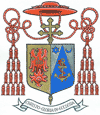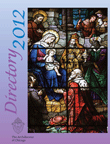
The Cardinal's Column
Francis Cardinal George, O.M.I.
The Lenten journey:
expressions of discipleship
Cardinal George's Schedule
- March 19: 10 a.m., Mass, Institute for Priestly Formation Symposium, Mundelein Seminary
- March 20: 5 p.m., Mass and Dinner, St. Joseph Seminary
- March 21: 10 a.m., Presbyteral Council Meeting
- March 22 - 26: Consistory, Rome
- March 27: 6 p.m., Vocation Evening, Residence
- March 28: 9 a.m., Catholic Schools Endowment Fund Meeting; 1 p.m., Administrative Council Meeting; 4 p.m., Catholic University Faculty Convocation, Lewis University, Romeoville
- March 30: 1:30 pm, Theology Club, Dominican University, River Forest; 6 p.m., Mundelein Seminary Evening of Tribute, Chicago Sheraton
- March 31: 10 a.m., Big Shoulders Fund Joseph Cardinal Bernardin Family Scholarship Reception, Visitation School; 3 p.m., Dwell in My Love Symposium, Catholic Theological Union
- April 1: 10:30 a.m., Czech Catholic Center, Our Lady of the Mount Parish

Cardinal's Appointments
His Eminence, Francis Cardinal George announces the following appointments:
Administrators
Rev. Dominic Grassi to be the administrator of St. Margaret Mary Parish, West Chase, effective immediately.
Most Rev. Francis Kane to be the administrator of Sacred Heart Parish, Winnetka, while retaining his duties as Episcopal Vicar of Vicariate II.
Rev. Patrick Marshall to be the administrator of St. Cletus Parish, LaGrange, while retaining his duties as director of the Pope John Paul II Center at the University of Illinois, Chicago Campus, effective immediately.
Associate pastors
Rev. Antony Aravindassery, from associate pastor of Prince of Peace Parish, Lake Villa, to be the associate pastor of St. Mary Parish, Evanston, effective immediately.
Rev. Michael Wheaton, from resident of St. Christina Parish, South Homan, to be the associate pastor of Infant Jesus of Prague Parish, Flossmoor, effective immediately.
Acting rector
Rev. Thomas Baima to be the acting rector of University of St. Mary of the Lake, Mundelein Seminary, while retaining his duties as provost of the same, effective immediately.
Associate director
Rev. Timothy Fiala, from faculty of University of St. Mary of the Lake, Mundelein Seminary, to be the associate director of the Pope John Paul II Center, University of Illinois, Chicago Campus and adjunct professor of St. Joseph College Seminary, effective immediately.
During Lent we learn again how to follow Jesus. It’s a journey that takes place interiorly and exteriorly, in our souls and in our actions.
1. Part of Mission Chicago was the 24 Hours of Grace, when parishes in each of the Vicariates made the sacrament of penance or reconciliation available for 24 consecutive hours. I heard confessions for several hours in one of the parishes and rejoiced again in the goodness and mercy of God to all of us who are sinners. Lent begins with an interior recognition of one’s sinfulness and a consequent desire for forgiveness. Sin by itself leads to despair, but sin that is forgiven through the mercy of God leads to hope now and life forever. Going regularly to confession means taking the moral life seriously, and that is the first condition for following Jesus. Celebrating the sacrament of penance means hearing Christ’s call to conversion to the depths of one’s heart and soul. When people return to the sacrament after 10 or 20 years, they are set truly free from their sins and can then begin to advance in grace.
2. The inner working of God’s grace finds external expression in the Church’s worship and in acts of charity and justice. Pope Benedict has reminded us in his recent encyclical letter that the Church called together by God’s love worships, proclaims the Gospel of Jesus Christ to the world and works to spread God’s love. The Church has many organizations and movements that express our following of Jesus by working to help others in his name. Each diocese has a Catholic Charities, and ours in Chicago is strong and exemplary.
An organization that is sometimes overlooked when talking about the Church’s charitable works is the Knights of Columbus. They are international in scope, although founded in the United States to help immigrant families. From that beginning, with an impetus to protect and help immigrants still necessary today, the Knights have continued to reach out to people in need. Theirs is the almsgiving of the Lenten season organized effectively. The 71,500 Knights in Illinois help people with mental retardation and learning disabilities. They donate to the Special Olympics and, this year, have participated in the Katrina Relief efforts, often adopting schools in the states most devastated by the hurricane. They regularly support college students in the Newman Centers on college campuses. As well, they sponsor multiple programs for youth. The Knights support crisis pregnancy centers and help women who choose not to abort their babies. They advocate in many ways for the protection of life in our society. They befriend seminarians and help them financially, and they pray for vocations to the ordained priesthood and encourage candidates. They work on building homes for the poor and on fundraising for many community and Church projects. They are men of the Church and their families, disciples of Jesus Christ working to make his love more visible in our society.
3. I mention the Knights of Columbus because they are having a membership drive this month and because, while particularly effective and praiseworthy, they are a case in point for many such associations sustaining discipleship in the Church. Discipleship, as it brings us all along the path to conversion, also generates strong loyalties. This is true not only for Christians but also for members of other faiths. Sometimes reactions of committed believers take the world, especially more secularized societies such as ours, by surprise.
Recently, a newspaper in Denmark ran a few cartoons holding Mohammed in ridicule. Muslims from all over, for whom Mohammed is the last prophet sent by the God of Abraham to instruct the world in God’s ways, reacted with fury. The depth of their belief and the absolutely central role it plays in their lives were not understood by many in societies grown accustomed to derision of religion and almost everything else. Surely, however, there should be a line between comment and even criticism on the one hand and expression of contempt on the other. Portraying the prophet Mohammed as a suicide bomber crossed a line. Violent reaction, however, also crossed a line.
On February 20, Pope Benedict XVI commented during his welcoming remarks to the Ambassador of Morocco to the Holy See: “Religions and their symbols must be respected, but intolerance and violence never can be justified as a response to the offense, since they are not responses compatible with the sacred principles of religion.” Sustained ridicule and contempt on the part of those who influence public opinion can create an atmosphere ripe for violence. St. Paul set out the Christian response in writing to the first Christians in Corinth: “When ridiculed, we bless; when persecuted, we endure; when slandered, we respond gently.” (I Cor. 4, 12-13) The path of discipleship is not a smoothly paved road. Whoever sets out on it with seriousness of purpose will encounter internal resistance from his or her own habits of sin and outward opposition from those who resent Christ’s call to conversion.
Authentic disciples of Jesus Christ are intensely identified with him and his Church. “Clasping sinners to her bosom, at once holy and in need of purification, the Church follows continually the path of penance and renewal” (Vatican II, Lumen gentium 8). Our Lenten journey takes us along this path of penance and renewal. Lent brings us to Easter and to the certain faith that evil will be overcome and that the truth and love of Christ will prevail. Let us continue together, united in prayer. God bless you.
Sincerely yours in Christ,
Francis Cardinal George, OMI
Archbishop of Chicago



